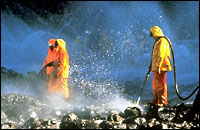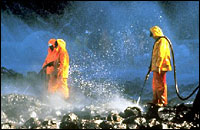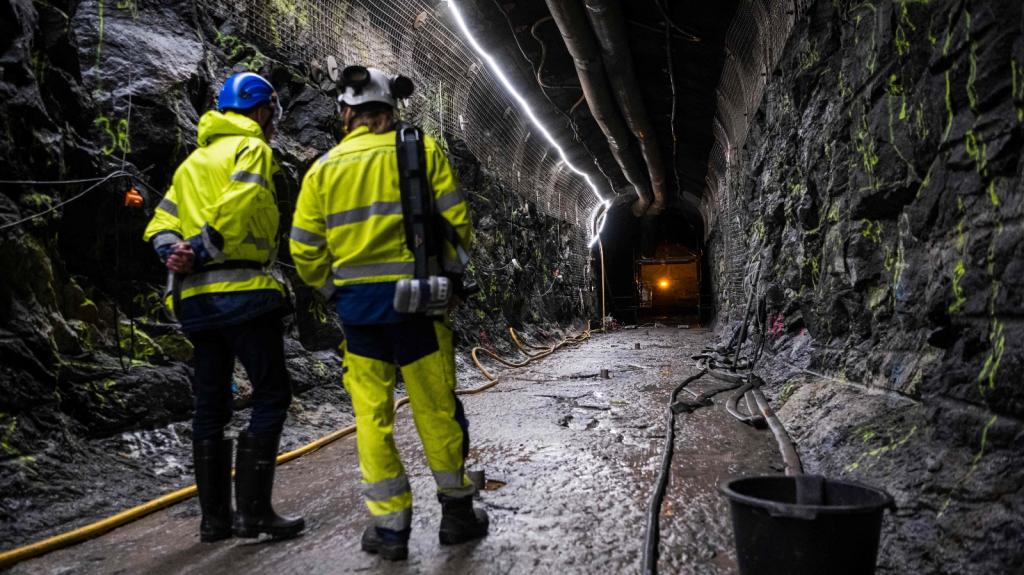My family has been intimately involved with Exxon through the years. My great-great-grandfather Maurice Clark went into the provisioning business with John D. Rockefeller around the time of the Civil War, but ended up selling the nascent oil-refining part of the business to Rockefeller in the late 19th century. Years later, my grandmother’s uncle ran Standard Oil of New Jersey, later to become Exxon; and most recently, my father spent his career working for the company in New York, London, and Rome.

Never mind the shoreline — who’s gonna fix the ship?
Photo: EPA
Exxon has always been the reflexive place where everybody in the family put their faith and their money. My brother and I grew up drinking out of Esso mugs and wanting foremost to go see the tigers at the zoo because that was Esso’s logo. When somebody forced Esso to change its name to Exxon in the United States, we found it petty. And when the Exxon Valdez ran aground in Alaska, we wondered what all the hue and cry was about. Wasn’t it bad enough to lose all that oil and have your boat dinged up?
Our family involvement paid off, sending generations of children to college, helping them to purchase houses, and allowing aspiring novelists to take time off to write books. In 2000, I was trying to write my first novel after quitting my job. At some opportune instant, in between paragraphs, this thought lodged in my head: “I need to solve global warming.” Being alone and sedentary in the basement, my novel bogged down, I was probably a perfect host organism for this rather gargantuan impulse.
I set about installing compact fluorescent bulbs, I bought a hybrid, I purchased renewable electricity for our house, I resolved with my wife to stop at two children — and after a spasm of such activity, I sat back with some premature, smug triumph, and wondered what else I could do.
Five years passed. One day I found myself idly reading a missive from Greenpeace about the evils of the ExxonMobil Corporation. I shook my head. Why was it always Exxon that people set their sights on? Why not Chevron or GM? Why not themselves, for that matter?
And yet, Exxon did seem basically indifferent to global warming. According to the literature, Exxon was donating heavily to the Competitive Enterprise Institute, an organization at the forefront of debunking climate science. For several years, I’d been marking a solid “yes” next to the ever-present call for a global-warming study on the Exxon proxy statements — the one that was always rejected.
I mentioned the Greenpeace crusade to my wife that night at dinner.
“Don’t you think you should sell your Exxon stock?” she responded.
“Why? So someone else can buy it?” Selling Exxon wouldn’t solve anything, I told her. They’re just a cog in a larger machine. It was the insatiable larger machine that needed to be reconfigured.
Yet, I reflected over the following months, to continue on as if my involvement meant nothing was subversive to my values. Perhaps it would be prudent to sell some Exxon as a sort of protest. What the heck — it might even work out in terms of portfolio diversification, in terms of making money when Exxon went down and something else went up.
“Well, I sold some Exxon,” I told my wife eagerly one day last year, feeling almost heroic.
“Good,” she said. “How much?”
“A lot,” I said, defensively. “The taxes will be humungous.”
“Really?” she said, disengaging, as I anticipated. She doesn’t like to hear about possible financial decay.

Tainted love.
Photo: iStockphoto
At tax time, the local H&R Block woman peered at my Schedule D reporting. “Does that Exxon stock say 1927?” she asked, clearly amused. “Never seen a 1927 stock before.”
She placed one finger under the final tally and turned the page toward me.
“Crap,” I said out loud. It was worse than I’d expected. Saving the world was one thing; reducing my net worth was another.
I returned home, chastened. I’d paid the global-warming doctor’s bill, and I suddenly felt cured of all my save-the-world impulses. For a couple months, I went on a carbon bender. I turned up the thermostat. I let our renewable-electricity plan expire. I pretended to separate the recycling, and threw it all away instead.
Sometimes I looked at my remaining Exxon holdings and I thought, that’s the only solid stock I own, the only one that doesn’t have a hope-and-wish-and-pray quality to it. It can flip the bird at everyone and not drop a cent in value.
Then, several weeks ago, a buddy of mine came over all in a lather. He’d seen An Inconvenient Truth. Describing it to me, he said, “Al Gore: yawn. And a movie about global warming: double yawn. And, on top of it all — it’s a friggin’ PowerPoint presentation: 10 yawns in a row. But dude, it’ll blow your mind!” For a good 20 minutes, he carried on about global warming.
Poor bastard, I thought, sympathetically. Yes, of course, we must do something, I said. Absolutely. We should all do what we can, given our smallness. But the most important thing, I said, is just to talk about it, to pass the word along.
He looked at me in a miserable, crumbling sort of way.
Not long after, on a “date night” with my wife, I found myself breathlessly watching Gore rise on his mechanical crane to show the path of atmospheric carbon dioxide concentrations. On that night, when I’d frankly wanted to see Superman Returns, I came face to face with my own inconvenient truth: when it came to global warming, I’d given up.
On our way home, shaken, we discussed the various things we could do: start an awareness club, re-sign up for renewable electricity, buy a more fuel-efficient car. “What about the rest of your Exxon?” my wife asked.
What about it? Hadn’t we already sold our protest shares?
And yet …
Here’s the thing I’ve learned about values: not only do they essentially work to your disadvantage, but you give them a bone, and they want your whole steak.
The following day, I called our longtime family broker. I had a pen ready, because I was sure I could get a good story out of this dramatic transaction.
“I need to sell the rest of my Exxon,” I said.
“OK,” the broker responded.
There was a pause on the line. “Anything else?” she asked.
“No, but I want to sell all of my Exxon,” I said. After a good century and a half of family involvement with the company, I expected something more — an argument, at the very least. Or, You’re *#@! kidding me! I was ready. Al Gore had made me ready.
Instead, the conversation ended there. I had her few measly words written down. I crumpled the paper up and tossed it aside. So much for the movie version.



